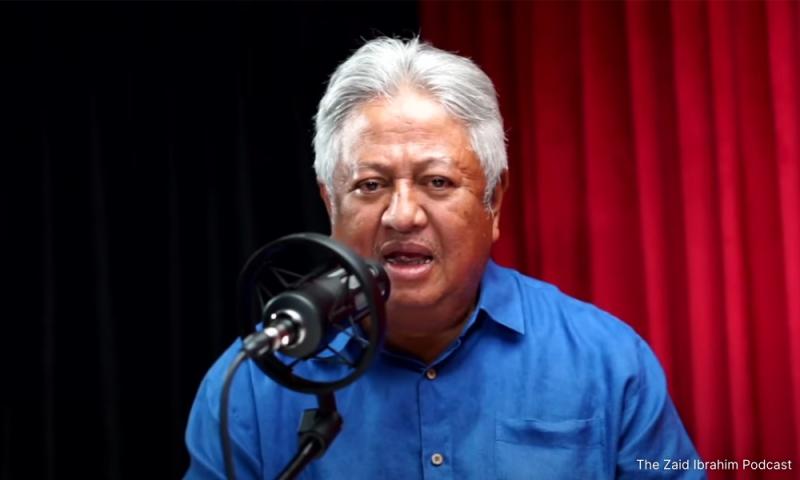Faiz Subri has created history for Malaysia - the first Malaysian to ever win the Puskas award - an award presented to those who have scored the most aesthetically significant, or ‘most beautiful’ goal of the year.
His achievement has put Malaysia on the globe, alongside Brazil, Portugal, Turkey, Slovakia, Sweden and Colombia - the winners of the past. The world-famous Cristiano Ronaldo was the first winner of this prestigious award.
Despite the awesome recognition Faiz Subri has bestowed upon the nation, there are some Malaysians who made a big fuss on his English proficiency. Is English proficiency a benchmark of intelligence in Malaysia? Alternatively, when a Malaysian speaks bad Bahasa Malaysia, why was there no similar outcry?
English did not become the premier language it is today overnight. In the course of history, many civilisations have emerged and disappeared, but one thing for sure these civilisations left numerous legacies and one of them is language.
During the golden age of Islamic era between the 8th to 13th century, Arabic was the world’s premier language. Likewise, when South-East Asia was dominated by Hindu-Buddhist influence, Sansksrit was the language of the elite. In addition, when Srivijaya and Malacca dominated South-East Asia, the lingua franca and language of trade of the region was Malay - now the national language of a number of countries namely Malaysia, Brunei Darussalam, Singapore and Indonesia (as Bahasa Indonesia).
English was the nonpareil language of Malaya, Sabah and Sarawak during British colonial rule. Upon independence of Malaysia (then Federation of Malaya) in 1957 and the formation of Malaysia in 1963, Malay language or Bahasa Malaysia was made the national language of the nation as embedded in Article 152 of the Federal Constitution.
English acts as Malaysia’s second language and serves as an important tool of communication alongside Bahasa Malaysia. Malaysia flourished as a country it is today through the usage of both languages that unite the nation. Despite the global importance of English, it is Bahasa Malaysia - the national language - that makes a Malaysian, a Malaysian.
When Faiz Subri was unable to speak fluent English during the Puskas award-presentation ceremony in Geneva on 10 January 2017, he was lambasted by a Malaysiakini contributor, Terence Netto in his piece entitled ‘If only Faiz could speak’. It was not surprising that some netizens agreed with Netto’s contention. For this group of Malaysians, English is seen as the benchmark of intelligence.
Ironically, when Tony Fernandes, the founder of AirAsia, clearly pronounced to the world that he does not speak Malay, nothing was said against him despite the fact that Malay (Bahasa Malaysia) is the national language of Malaysia. This was reported in a Free Malaysia Today article entitled ‘No interest in being FAM president, says Tony Fernandes’ published on Sept 11, 2016.
In addition, the Member of Parliament (MP) of Kuching, YB Chong Chieng Jen, refused to speak Bahasa Malaysia during the debate on the 2016 Supply Bill at committee level for the Prime Minister’s Department in November 2015. Even if he did speak Bahasa Malaysia, he may not converse entirely fluently - up to the standards required of a Malaysian MP.
It is not absolutely surprising that there are still members of state legislative assemblies out there who could not speak fluent Bahasa Malaysia - despite 60 years of Malaysian nationhood.
In contrast, across the Johor Causeway, the Prime Minister of Singapore, Lee Hsien Loong, made a point to deliver his annual National Day Rally speech in Malay every year. He speaks better Malay than some Malaysians and easily puts a lot of Malaysian MPs and assemblypersons to shame.
Having said this, where were all the adverse comments usually made against those Malaysians who are not fluent in English? Why didn’t these Malaysians who are unable to speak fluent Bahasa Malaysia get a cordial piece of lambasting as well? What is with the double standards?
Conclusion
Faiz Subri is a national athlete and English is not a requirement in his profession. He has done the country proud and his effort to speak English is praiseworthy. Many renowned world celebrities like Antonio Banderas, Celine Dion and Cristiano Ronaldo were unable to speak good English during their early years of fame. Did the people of Spain, Canada and Portugal respectively denounced them like how some Malaysians did against Faiz Subri for his English?
Despite criticism made against Malaysians, an online English news portal The Independent listed Malaysia as among the top 15 countries that speak English as a second language best. It is ironic that some Malaysians like to over-criticise, as if they are the best brains in the world.
It is also sad that Malaysians do not equally jump onto the bandwagon and react the way they should against those fellow compatriots who do not speak fluent Bahasa Malaysia.
Putting these aside, Faiz Subri is a national hero and his success should not be undermined just because of his command of the English language. English is just a language and should not in any way be used as a benchmark of human intelligence.
DR MOHD HAZMI MOHD RUSLI is a senior lecturer at the Faculty of Syariah and Law, Universiti Sains Islam Malaysia and a visiting professor at the School of Law, Far Eastern Federal University, Vladivostok, Russia.





